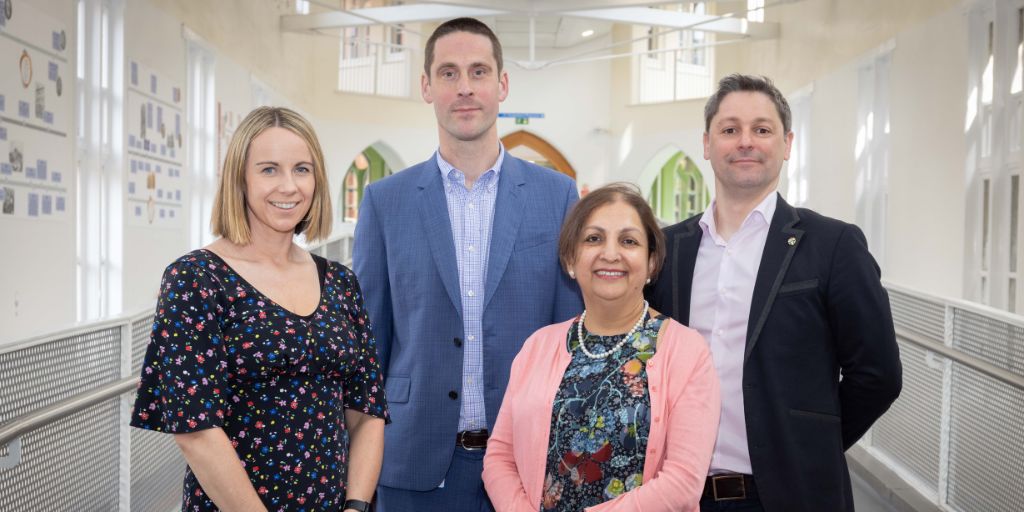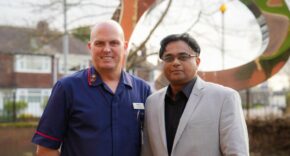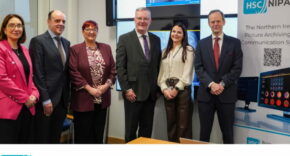
Patients in Leeds and the surrounding area with potential symptoms of Motor Neurone Disease (MND) will get access to earlier diagnosis as two ambitious new research initiatives prepare to launch in the city. Aimed at significantly reducing the time it takes to diagnose MND, the new projects have been made possible thanks to an investment of more than £230,000 by Leeds Hospitals Charity.
The projects will leverage artificial intelligence and advanced technology to enhance diagnostic accuracy and improve outcomes for patients at the new Rob Burrow Centre for Motor Neurone Disease. The new centre is set to open later this year and the announcement of these new research projects solidifies the ambition to develop the much-needed new facility into a centre for excellence for MND care in the region, and to launch research that could potentially benefit patients worldwide.
Given the devastating nature of the disease and the impact on patients from the uncertainty they face while their symptoms are being investigated, Dr Agam Jung, Consultant Neurologist at Leeds Teaching Hospitals and Director of the Leeds MND Centre, recruited Dr Stuart Currie, Consultant Neuroradiologist and Dr Stefan Williams, Consultant Neurologist, to investigate the possibility of innovative techniques to provide earlier diagnosis of MND. They will work together with colleagues from the University of Leeds to develop their research studies, which could be up and running in early 2026.
Research project 1 – A UK-first for MND – MRF (Magnetic Resonance Fingerprinting)
Dr Currie plans to use a novel MRI (Medical Resonance Imaging) technique called MR Fingerprinting (MRF) to detect upper motor neurone signs in the brain. Unlike standard MRI used in clinical practice, MRF quickly quantifies multiple brain areas at once. This provides measurements of brain tissue rather than just what the brain looks like to the human eye. By examining multiple areas of the brain, Dr Currie hopes to measure abnormalities in the underlying brain tissue of patients with MND that do not exist in healthy volunteers.
Dr Currie has collaborated with Professor Dan Ma in the US to learn how this technique can be adapted for use in MND and University of Leeds colleague, Professor Jurgen Schneider, will be bringing this technology from the US team in the autumn, with an aim to start testing with patients in early 2026.
Research project 2 – A UK-first for MND – Computer vision to detect the signs of MND
Currently, most people with suspected MND undergo a specialised test using painful needles and electricity, called electromyography (EMG). Dr Williams plans to test a new way of detecting and measuring the signs of MND, using artificial intelligence on videos of patients’ limbs and tongues to identify small muscle twitches that are a key sign of the condition.
This is a collaboration with computer scientists at the University of Leeds, Dr David Wong and Dr Sam Relton. The aim is to develop a simple test that can help doctors recognise the signs of MND earlier, using AI applied to input from an ordinary camera (e.g. in a smartphone). This could help to reduce the long delay before a final diagnosis.
Dr Jung said, “I am delighted that we are launching our own MND research projects here in Leeds for the very first time. This is something that I have been wanting to do for a long time and now with the additional funding from Leeds Hospitals Charity, this vision to help early diagnosis is a reality. It’s positive news for our current and future patients.
“Time and again, I bear witness to anxiety and fear during the diagnostic journey. There is an urgent need to identify diagnostic tools fit for the modern times we live in. Harnessing technology, machine learning and artificial intelligence will help us alleviate our patients’ suffering significantly and give them a better chance to make the most of their lives, to ‘live in the now’.
“I am very grateful to the public for their extensive fundraising, the vision for our new centre was always to go above and beyond with patient and family care, and the research projects will help distinguish the Rob Burrow Centre for MND further.”
After reaching its £6.8 million fundraising target for the Rob Burrow Centre for Motor Neurone Disease Appeal in December 2024, the charity is continuing to fundraise as part of ongoing efforts to transform lives for people living with MND and to support their loved ones.
Esther Wakeman, CEO of Leeds Hospitals Charity said, “After reaching our fundraising target for the Rob Burrow Centre for Motor Neurone Disease, we knew we wanted to continue to support the Leeds MND Service to ensure we can support the Leeds Teaching Hospital Trust in setting this centre apart from anything else.
Building the centre is just the start of our journey.
“The centre’s purpose-built environment will enhance the care experience for patients and now investing in this world-leading research, we’re progressing to our vision to make this a real centre of excellence and potentially a blueprint for the future.”
The projects will involve a multidisciplinary team working across key hospital sites and academic institutions and will be supported by colleagues from the University of Leeds: Prof Jurgen Schneider, Physicist and Dr David Wong, Computer Scientist.
The new Rob Burrow Centre for MND is expected to be open in Autumn 2025, and it is hoped that research led by Dr Williams and Dr Currie will begin in conjunction with this and patients will be recruited in early 2026.
The findings from these projects could pave the way for innovative approaches to MND diagnosis and treatment, offering new hope to patients and their families.
To find out more about the Rob Burrow Centre for MND visit http://www.











